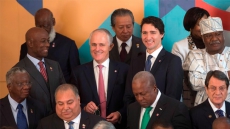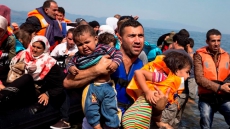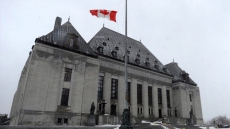The federal government has pledged to bring 25,000 Syrian refugees to Canada between now and the first few months of 2016. Of that number, 10,000 will be sponsored privately rather than by the government.
A private sponsorship entails a substantial commitment, of which money forms only a part. Here are some key details about what's involved:
Q: How does Canada's private sponsorship of refugees program work?
A: The private sponsorship program relies on both major organizations and smaller groups to take responsibility for refugees entering the country.
Private sponsors are involved at every step of the process, from filling out initial paperwork, maintaining contact with the refugee family before their arrival, coaching them through the screening process and providing for them for the first several months of their time in Canada.
Some organizations that provide this service on an ongoing basis are formally recognized by Citizenship and Immigration Canada (CIC) as Sponsorship Agreement Holders. Smaller groups are also permitted to sponsor refugees.

Q: What is the difference between privately sponsored and government-sponsored refugees?
A: The main distinction pertains to who pays the tab. Government-sponsored refugees see their arrival and resettlement expenses picked up by CIC.
Private sponsors are on the hook for the refugees' travel, accommodation, food and other living expenses. They are also expected to provide emotional support and help refugees integrate into Canadian society.
Other resettlement services, such as language training and orientation needs assessments, are still paid for by the government. Private sponsors are expected to fund the refugees for either 12 months or until the new arrival is self-sufficient, whichever comes first.

Q: Are there restrictions on who can be sponsored? What does the private sponsorship process look like?
A: The first step of the process involves determining whether a refugee is eligible for private sponsorship, since only two specific classes of refugee can be accommodated through this channel (the Refugee Abroad class and the Country of Asylum class).
A visa officer is the one to make this decision after interviewing the refugee, performing security and medical checks, and reviewing supporting documentation filed by the sponsor.

Q: What are private sponsors committing to provide?
A: Private sponsors are responsible for nearly every aspect of a new refugee's arrival in Canada. They must provide initial accommodation, furniture and other household basics, utilities, food, clothing, transportation costs and "other basic necessities of life."
They're also expected to help line up crucial supports like interpreters or family doctors, as well as assisting with more bureaucratic processes such as school enrolment or registration for health-care coverage. Sponsors are also supposed to provide emotional support and help refugees establish a social network.

Q: Can private sponsors choose who to support?
A: Sometimes. Referred sponsors are refugees that have come to the sponsor's attention in some way, and applications for such refugees are accepted.
In cases where sponsors don't have anyone in mind, however, the Visa Office can match them with people who have been flagged by the United Nations High Commission for Refugees. Only Service Agreement Holders and their constituent groups can be matched with visa office referrals.
Sponsors can browse through an online listing of refugee profiles and indicate interest in the ones that seem best suited to their communities. Sponsors cannot agree to support a single member of a family unit — all family members have to be included on an application.

Q: How much do sponsors pay per refugee?
A: It varies by province, but the government expects sponsors to provide a level of support that's at least equal to social assistance rates in the province.

Q: How does the current sponsorship drive impact private sponsors?
A: The humanitarian crisis in Syria has led to a widespread easing of regulations for private sponsors, as well as a decrease in the costs they shoulder.
The government will pay for medical and travel costs for privately sponsored refugees fleeing the country. Health-care coverage will also be provided by the federal government, a departure from normal protocol in which the province assumes those costs.





